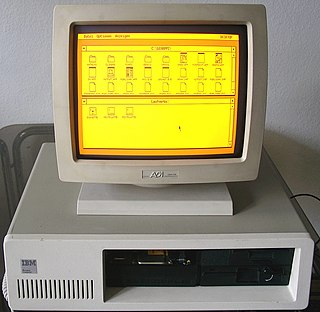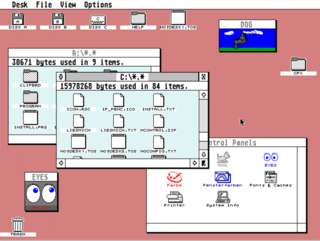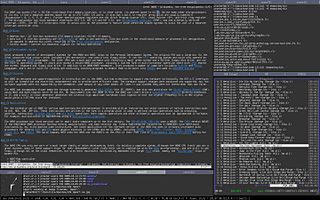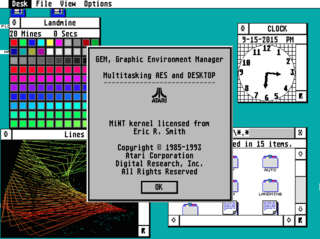
SpareMiNT is a software distribution based on FreeMiNT, which consists of a MiNT-like operating system (OS) and kernel plus GEM compatible AES (Application Environment Services).

SpareMiNT is a software distribution based on FreeMiNT, which consists of a MiNT-like operating system (OS) and kernel plus GEM compatible AES (Application Environment Services).
The English language distribution is intended for the Atari ST and derivative m68k computers, clones and emulators, such as the FireBee project or Hatari and ARAnyM. The MiNT itself, also once called MultiTOS, provided an Atari TOS compatible OS replacement with multitasking and multi-user switching capabilities and Unix-like operation, all of which the original TOS lacked.
The distribution comes with Red Hat's rpm utility for managing the source- and binary packages. Unix/Linux-style software can be used, if ported, GEM-programs for TOS can run concurrently. The TOS clone EmuTOS , instead of Atari's original, can be used as a base to boot a MiNT, and e.g. XaAES , a modern AES derivate, as essential part of the GEM-GUI (Graphical user interface).
FreeMiNT, and therefore SpareMiNT, is basically the enhanced and greatly improved derivate, and can be used on today's computers, even on different hardware platforms via emulation or Virtual Machines, thanks to the flexibility of the original MiNT and its components that made further development possible.
Derived from SpareMiNT is EasyMiNT, using its software repository and a GEM based installer, providing a folder system similar to the UNIX Filesystem Hierarchy Standard and German language translations to programs.
AFROS (Atari FRee Operating System) comes as a set of files, creating a TOS compatible operating system; there exists a Live-CD to test. Its key components all consist of Free Software:
AFROS software is available to all Atari and/or TOS compatible platforms, but is optimized to be used with the ARAnyM (Atari Running on Any Machine) emulator.
Amongst other efforts, there also was a basic build of a Debian GNU/MiNT distribution, with a FreeMiNT kernel, GNU based userland software plus DEB package management. It should have provided commonly used programs and was based on Debian Linux. Similar, more successful projects are Debian GNU/kFreeBSD, Debian GNU/Hurd and, most important, the Linux version. SpearMiNT follows the idea to use a Unix/Linux-like package management and software repository.

GNU is an extensive collection of free software, which can be used as an operating system or can be used in parts with other operating systems. The use of the completed GNU tools led to the family of operating systems popularly known as Linux. Most of GNU is licensed under the GNU Project's own General Public License (GPL).

GNU Hurd is a collection of microkernel servers written as part of GNU, for the Mach kernel. It has been under development since 1990 by the GNU Project of the Free Software Foundation, designed as a replacement for the Unix kernel, and released as free software under the GNU General Public License. When the Linux kernel proved to be a viable solution, development of GNU Hurd slowed, at times alternating between stasis and renewed activity and interest.

A Linux distribution is an operating system made from a software collection that is based upon the Linux kernel and, often, a package management system. Linux users usually obtain their operating system by downloading one of the Linux distributions, which are available for a wide variety of systems ranging from embedded devices and personal computers to powerful supercomputers.

GEM is an operating environment which was created by Digital Research (DRI) since 1984 for use with the DOS operating system on Intel 8088 and Motorola 68000 microprocessors.

MiNT is Now TOS (MiNT) is a free software alternative operating system kernel for the Atari ST system and its successors. It is a multi-tasking alternative to TOS and MagiC. Together with the free system components fVDI device drivers, XaAES graphical user interface widgets, and TeraDesk file manager, MiNT provides a free TOS compatible replacement OS that can multitask.

EmuTOS is a replacement for TOS, released as free software. It is mainly intended to be used with Atari emulators and clones, such as Hatari or FireBee. EmuTOS provides support for more modern hardware and avoids the use of the old, proprietary TOS as it is usually difficult to obtain.

In Unix computing, Ion is a tiling and tabbing window manager for the X Window System. It is designed such that it is possible to manage windows using only a keyboard, without needing a mouse. It is the successor of PWM and is written by the same author, Tuomo Valkonen. Since the first release of Ion in the summer 2000, similar alternative window management ideas have begun to show in other new window managers: Larswm, ratpoison, StumpWM, wmii, xmonad and dwm.

Yggdrasil Linux/GNU/X, or LGX, is a discontinued early Linux distribution developed by Yggdrasil Computing, Incorporated, a company founded by Adam J. Richter in Berkeley, California.

Within the free software and the open-source software communities there is controversy over whether to refer to computer operating systems that use a combination of GNU software and the Linux kernel as "GNU/Linux" or "Linux" systems.
The Atari Coldfire Project (ACP) is a volunteer project that has created a modern Atari ST computer clone called the FireBee.

MicroEMACS is a small, portable Emacs-like text editor originally written by Dave Conroy in 1985, and further developed by Daniel M. Lawrence (1958–2010) and was maintained by him. MicroEMACS has been ported to many operating systems, including CP/M, MS-DOS, Microsoft Windows, VMS, Atari ST, AmigaOS, OS-9, NEXTSTEP, and various Unix-like operating systems.

Linux is a family of open-source Unix-like operating systems based on the Linux kernel, an operating system kernel first released on September 17, 1991, by Linus Torvalds. Linux is typically packaged in a Linux distribution.

Hatari is an open-source emulator of the Atari ST 16/32-bit computer system family. It emulates the Atari ST, Atari STe, Atari TT, and Atari Falcon computer series and some corresponding peripheral hardware like joysticks, mouse, midi, printer, serial and floppy and hard disks. It supports more graphics modes than the ST and does not require an original TOS image as it supports EmuTOS. The latest version has no reported issues with the ST/STe/TT applications emulation compatibility and also most of the ST/STe games and demos work without issues.
XaAES is a graphical user interface for the OS kernel MiNT, and is aimed at systems that are compatible with 16/32 bit Atari computers such as the ST, TT or Falcon. The combination of MiNT and XaAES is the natural successor to MultiTOS.
GNU variants are operating systems based upon the GNU operating system. According to the GNU project and others, these also include most operating systems using the Linux kernel and a few others using BSD-based kernels.

TOS is the operating system of the Atari ST range of computers. This range includes the 520ST and 1040ST, their STF/M/FM and STE variants and the Mega ST/STE. Later, 32-bit machines were developed using a new version of TOS, called MultiTOS, which allowed multitasking. More recently, users have further developed TOS into FreeMiNT.
MagiC is a third party and now open-sourced multitasking-capable TOS-compatible operating system for Atari computers, including some newer clone systems manufactured later. There are also variants that run as part of Mac and PC emulation environments, as well as on macOS Intel-Mac computers.